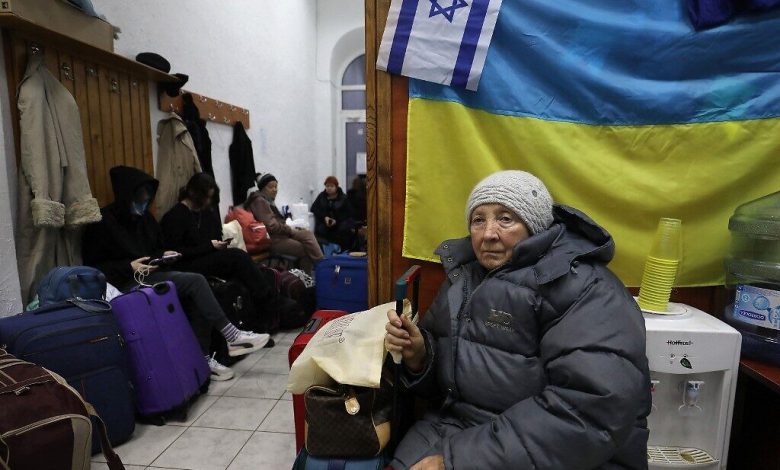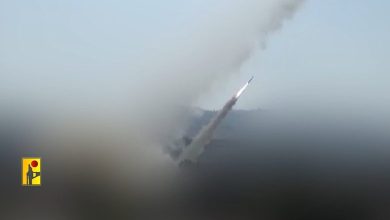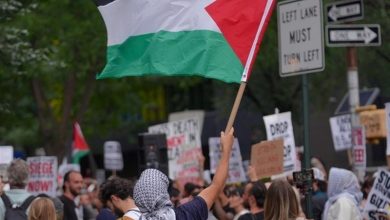Horrifying treatment of Ukrainian refugees in ‘israeli’-occupied territories
By Kit Klarenberg In the wake of Russia's military operation in Ukraine, which began in February last year, millions of Ukrainian citizens - including women and children - have fled the country to seek refuge elsewhere.

Reports of Ukrainian refugees encountering nightmarish, unsafe conditions in their adopted countries are countless.
Britain’s Homes for Ukraine had been operational less than a month, for example, before the UN High Commissioner for Refugees (UNHCR) demanded official oversight of the scheme be drastically overhauled and “adequate safeguards” put in place to protect against “exploitation” of the scheme’s beneficiaries, due to increasing reports of women “feeling at risk from their sponsors.”
Such a squalid state of affairs nonetheless pales in comparison to the horror that welcomed Ukrainian refugees who took up residence in the Israeli-occupied territories.
A local media report published in early January, conveniently dismissed by the Western media, documents widespread abuse, rape, and exploitation – which gives the impression of being facilitated, if not encouraged, by Israeli authorities.
In total, approximately 47,000 Ukrainians not eligible for citizenship under the Israeli regime’s grossly discriminatory Law of Return travelled there following Russia’s military operation in Ukraine, according to the regime’s so-called ‘welfare ministry’.
Not a single one was accorded formal refugee status, and of these, only around 15,000 remain. And it’s not hard to see why.
Ukrainians fleeing to seek refuge in the Israeli-occupied territories mostly arrived with no possessions or savings and tried to find work to support themselves.
Yet numerous legal barriers made this initially impossible, and despite subsequent reforms intended to secure employment, many still struggle, bouncing from one insecure, undocumented, poorly paid short-term job to another.
“The reality is that you are locked in some room in the center of Israel and you need to work — a lot. You’re illegal here, your work is illegal, your stay is illegal, and your owner remains fully in control. You can’t do anything,” one refugee quoted in the report laments.
This sad state of affairs created a veritable feeding frenzy for exploitative employers, who offer employment in return for a sizable cut of a Ukrainian’s earnings.
The report states how one woman in her 50s was introduced to an Israeli man with “strong business links” in Kiev, who offered her work, an apartment, health insurance, and everything she needed to get started.
Upon arrival, he housed her in a shared room in a cramped apartment rife with mold and fungus, where two other families also lived.
She was forced to work two backbreaking five-hour shifts every day, travelling to and fro in minibuses without air conditioning in the scorching heat. Every time her working day was complete, he deducted half her wages.
Her health has deteriorated sharply since arriving in the occupied territories, and she now experiences migraines and anxiety attacks but is trapped by her employer, according to the report.
After trying to leave his clutches and find work elsewhere, he threatened to report her to authorities as an undocumented migrant, which would mean she was deported “within 48 hours.”
In July, sharp limits on where Ukrainians could work were introduced, with outright bans on legal employment for refugees in 17 cities, including Tel Aviv and Jerusalem, where work is most likely to be found.
The Israeli regime’s outgoing interior minister Ayelet Shaked subsequently imposed further restrictions, prohibiting any Ukrainian who arrived since October from working at all, anywhere.
Telegram and WhatsApp groups offering work with no paper trail have popped up in profusion since February 24 last year. Offers of roles in massage parlours as well as sex work are plentiful.
In a perverse twist too, several Ukrainians were put up by authorities in a ‘hotel’ that a representative of an organization assisting Russian and Ukrainian Jews described as “literally a brothel.”
They claim a representative of the welfare ministry admitted to knowing the nature of the premises.
Ukrainians staying at the site had windowless rooms and were kept awake by wild parties and the sound of people indulging in illicit sexual activities round the clock elsewhere in the building.
“I feel like Israeli authorities hate us here. It’s as if we smell bad or something,” was how another refugee described her interactions with interior ministry officials.
Most disturbing of all, the report documents how numerous Ukrainians were raped by Israeli men who wrote them letters of invitation, which helped get them out of the warzone.
In attempting to report these heinous crimes, the victims “encountered a maze of bureaucracy and lost any motivation” to bring their attackers to justice, with police and social services effectively off-limits.
In one instance, a Ukrainian woman reported her rapist to authorities, only to be told via text message after weeks of silence that the charges had been dropped due to “insubstantial” evidence.
As foreigners in the occupied territories, they are not entitled to free legal aid, and therefore must pay thousands of shekels to private lawyers for basic representation. At least one victim has committed suicide as a result of these horrid experiences.
Very occasionally, these incidents leak out into local media. In March, an Israeli man was arrested on suspicion of breaking into the apartment of a Ukrainian woman in Jaffa, then raping and robbing her.
Two months later, an Ashdod resident was arrested and indicted for the alleged rape of a 19-year-old Ukrainian woman. He reportedly offered to help her find a cleaning job, and under the pretext of giving her a ride to work, drove her instead to a hotel where he raped her.
“Many of these abuses remain at best under the radar of the authorities or at worst wilfully ignored, leaving the victims in a cycle of violence and poverty that only deepens the trauma they have endured to date. The perpetrators remain free to commit further crimes,” the report notes.
Such abuses are all the more perverse when one considers that the Israeli regime loudly advertised its welcome of Ukrainians as a symbol of its “tolerance and progressive values”. There were even more cynical motives at work, too. Initially, it was intended by the apartheid regime that these refugees would further its criminal project of settlement expansion on Palestinian lands.
They were to be given property in the occupied Palestinian territories, in order to populate those areas – deemed as illegal by the United Nations in its multiple resolutions – in the process of transforming them into colonizers and settlers.
The effort was even given an official moniker, “Operation Israeli Guarantees”.
Palestinian Prime Minister Mohammad Shtayyeh strongly warned against such misadventure, as Ukrainians arrived at settlements in the occupied West Bank, including Yitzhar, a key base of operations for Zionist extremists who routinely attack indigenous Arabs and steal their property.
It is truly remarkable and obnoxious that not a single Western journalist has deemed this shocking report fit to report on weeks since its publication.
Nonetheless, such an oversight is understandable and entirely predictable, given the mainstream media’s omerta on the Zionist regime’s vicious, never-ending crimes against the Palestinian people – and it is arguable that conspiracy of silence is precisely why Israelis feel emboldened to mistreat hapless Ukrainian refugees.
In a truly just world, the experience of Ukrainian refugees in the occupied territories would trigger widespread scrutiny of the Zionist project more generally.
For if that murderous ideology’s adherents have no qualm about subjecting people who enjoy nearly universal public and media sympathy across the Western world to such savage abuse, one can only imagine how much worse a captive population suffers under those occupiers.
Kit Klarenberg is an investigative journalist and MintPresss News contributor exploring the role of intelligence services in shaping politics and perceptions. His work has previously appeared in The Cradle, Declassified UK, Electronic Intifada, Grayzone, and ShadowProof. Follow him on Twitter @KitKlarenberg.
From Presstv




